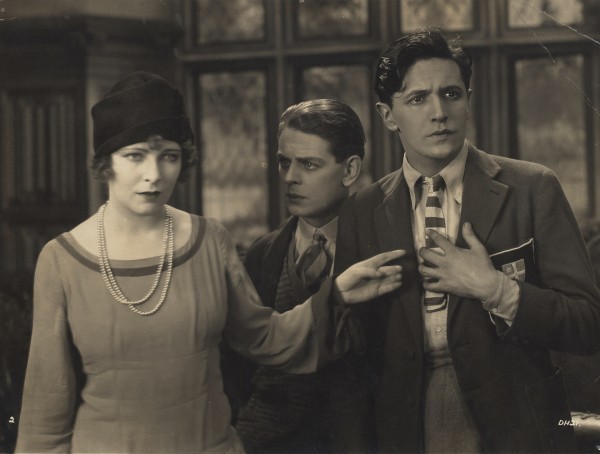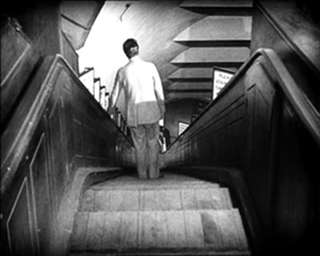The Hitchcock 9 - 3 ANNETTE BENSON, ROBIN IRVINE, AND IVOR NOVELLO IN DOWNHILLDownhill (May 1927)
ANNETTE BENSON, ROBIN IRVINE, AND IVOR NOVELLO IN DOWNHILLDownhill (May 1927)The Gainsborough production company wanted Ivor Novello back with Hitchcdock after the success of
The Lodger, so Hitchcock adapted Novello's stage play, which he'd written with Constance Collier under the joint nom de plume of David L'Estrange. Though 34, Novello plays the lead role of Roddy Berwick, an outstanding public schoolboy who takes the rap when his best pal, Tim Wakely (Robin Irvine), who's on a scholarship, is accused by a local tuck shop girl of making her pregnant. Roddy is expelled, and when called a liar at home by his wealthy father Sir Thomas Berwick (Norman McKinnel) for denying any real guilt, is so angry and insulted he leaves home. A downward path follows, symbolized by a shot Hitchcock later thought too obvious of Roddy descending on a long escalator into the depths of the London Underground.

Each time he seems abused by a woman, first the accusing tuck shop girl, then a greedy actress he falls for who uses up his inheritance from his godmother and tosses him out, then a nightclub Madam who makes him dance with lonely old women for pennies. A BFI note suggests this may reflect "the experience of Novello himself, a gay matinee idol oppressed by unwanted female attention." It also suggests Roddy is one of Hitch's "vulnerable blond" protagonists subject to his "fetishistic gaze." This also qualifies as a "wrong man" plot, the BFI notes, but without "the element of pursuit" found in
The 39 Steps and other films.
Novello, who looks young enough as well as appropriately naive and foolish despite his 34 years, is engaging to watch as he goes through his travails. The school passage is not the best, lacking verisimilitude. In a playing field scene Novello seems to be posing with the ball rather than even really participating in the game; the scene of the girl's accusation before the headmaster is plagued by longueurs. But once Roddy leaves home and takes up with the showgirl, Julia (Isabel Jeans), there is conventional fun, with the usual display of fancy clothing and vast interiors. At first he has only an old suit to wear and pretends he doesn't want to wear an overcoat. Then the £30,000 comes from his godmother and he appears looking dashing in evening clothes with top hat -- and nice overcoat, thus arousing Julia's interest. He is foolish enough to marry her, even though there is an older beau in her life, her leading man, Archie (Ian Hunter), who never really goes away. The £30,000 (which becomes tiny in a later intertitle) vanishes to pay off Julia's clothing bills soon enough and since he has signed over the flat to her, when he discovers Archie hiding in a closet it's she who kicks Roddy out, not the reverse. It is only here, well past half way, that Roddy's path really turns decisively "downhill," the £30,000 having been a decisive if temporary reprieve from consequences of family rejection and proud refusal to humble himself before Sir Thomas.
A much commented upon reveal shot pulls gradually away from Roddy, making it first appear that he's now working as a waiter, then showing that he's
playing one on stage.
Roddy's rock bottom, after he leaves a Marseilles dance hall fed up with being paid a pittance to dance with older women, is down by the docks, where he's delirious, and some of the people at a lowly bar where he's staying take him back to England. There are excellent uses of tint changes here for Roddy's delirium, and woozy shakey-cam shots as he sees troubling images of his degenerating existence -- some of the most interesting editing and cinematography Hitchcock has done up to this point. Roddy arrives back at the family home still in a state of delirium, sitting in an armchair in terror of what his father will do or say. But all is well: word has come through that Roddy did nothing wrong at school after all, all is forgiven, and (as at the end of
The Lodger) hope is restored. He is embraced by father and mother. The last sequence is the "old boys match" at school, where again Roddy is a winning rugby player. Amusingly, in the final shot he again is only shown, not playing, but lying on the ground with a ball, smiling. But despite these falsifications and much conventionality, there have been some interesting sequences in the latter part.
This film was released in the United States under the title
When Boys Leave Home. On the DVD of the BFI restoration there is musical accompaniment added of solo piano. Here, as in
The Pleasure Garden and
The Lodger, the original various color tints that shift from scene to scene have been preserved. However, the contrast level is not as good as in some of the later films in the series.
Reviewed as part of the US premiere of The Hitchcock 9 BFI-restored silent films by the San Francisco Silent Film Festival, shown at the Castro Theater June 14-16, 2013.





